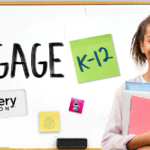By Deborah Nelson, Music Teacher at the Royal Palm School in Florida
Okay, I’m gearing up for the new academic year. My students have significant cognitive and physical challenges and each one uniquely different from the others. Yes, they are all classified by law as being intellectually disabled yet their abilities and needs call for extraordinary teaching techniques to facilitate differentiated learning and differentiated ways for them to respond. A key part of this is inclusion and making sure activities are social.
Good planning is the place to start
Universal Design for Learning is a great way to think about teaching and learning for building units that can contain cross curriculum activities or integration and multiple ways to teach, respond, and assess learning. The Individual Education Plans (IEPs) that all special education students have include a wide variety of goals, strategies, accommodations, and modifications. Today, it seems as if these goals, the very drivers of special education, have taken a back seat to the assessment that is linked to the school’s grade and ultimately the school district’s grade. Often times in special education classrooms students are not taught in ways that provide for socialization, one of the areas addressed in IEPs. There seems to be little meaningful student communication other than to match, choose, identify, or otherwise “hit the switch.” Are we teaching students to push a button or are we helping them learn to communicate, make choices solve problems and learn life skills. Activities need context and purpose and if these can be rooted in social activity and community they are more motivating, meaningful and relevant.
Championing this socially inclusive approach is easier than you think. Here are 4 tips to help you get started.
(1) Music: Group music making projects are an easy place to start. Naturally social and multisensory. The extensive array of digital interfaces for music making helps to include special needs students in more meaningful and beneficial activities.
(2) AAC: Alternative and Augmentative Communication Devices (AAC). AAC has really come a long way in the last few years with some great apps that are much easier to use, offering lots of choice in format and complexity. These platforms provide students with the opportunity to be part of the group, taking part in decisions and choices. To be heard and included.
(3) Multisensory: There are a range of teaching techniques that involve realia, concrete objects, videos, pictures, proprietary icons, along with supports for students with low vision, no vision, low hearing, no hearing, and sensory issues all help to link the new declarative knowledge or the procedural knowledge to prior knowledge. The specialists at your school would love to help with integration projects. Multisensory work is naturally inclusive and can enable students to engage with peers on a variety of levels.
(4) Songs: Going back to music there is so much you can do with a simple song. By examining the framework of early childhood songs one can naturally incorporate developmentally appropriate and age appropriate musical experiences in a social format. Think about call and response songs, verse and refrain songs, cumulative songs, action song, dance songs, game songs, and story songs to name a few. These forms all can be modified and creatively applied to learning with new lyrics that pertain to content areas.
Social and Emotional Learning
Even on the functional level of matching, there are ways to add the social emotional aspect by making the solo response part of a refrain or repeated part of a song with peers as active partners stopping their playing (of melody, harmony, rhythm, or sound effects) only to resume after the response. All of this can be visually cued with pictures by a student director assisted by the teacher if needed and could be considered reading for students on this level.
In addition to the state’s music access points I have been required to support the themes that the academic teachers have to follow each month through the Unique Learning System ®. That means I’ve been linking music to reading, writing, math, science and social studies. It’s easier than you might imagine. Additionally, when music that has lyrics and melody is catchy, students actually can remember the subject content more easily. Plus, students are motivated to practice and that practice helps them move their learning into long term memory. Just add an ensemble part for everyone on their developmental level. If your school has an Orff trained music teacher, he or she will have lots of ideas of language-based techniques that could be added to specific content.
The Emotional Hook
Within a lesson format there is one more trick that fosters learning. That is, adding an emotional hook. By bringing in multi-sensory experiences with the excitement they bring it makes learning more fun, meaningful, and ultimately useful. It activates more areas in the brain with more connections to help learning and long-term memory. It could be the difference between reading or hearing a story or information and providing a virtual experience of it. Adding ocean sounds, creating waves with material, experiencing a real fish, and hearing a sea chanty, will help to create understanding of that era faster and better than just telling students about it.
Ready to create social inclusion in your classroom?
CLICK HERE to get a FREE 45 minute professional development session with Skoog Music and a 60-day free trial of Tippy Talk’s AAC platform.
The American Consortium for Equity in Education, publisher of the "Equity & Access" journal, celebrates and connects the educators, associations, community partners and industry leaders who are working to solve problems and create a more equitable environment for historically underserved pre K-12 students throughout the United States.
- American Consortium for Equity in Educationhttps://ace-ed.org/author/admin/
- American Consortium for Equity in Educationhttps://ace-ed.org/author/admin/April 23, 2025
- American Consortium for Equity in Educationhttps://ace-ed.org/author/admin/
- American Consortium for Equity in Educationhttps://ace-ed.org/author/admin/







